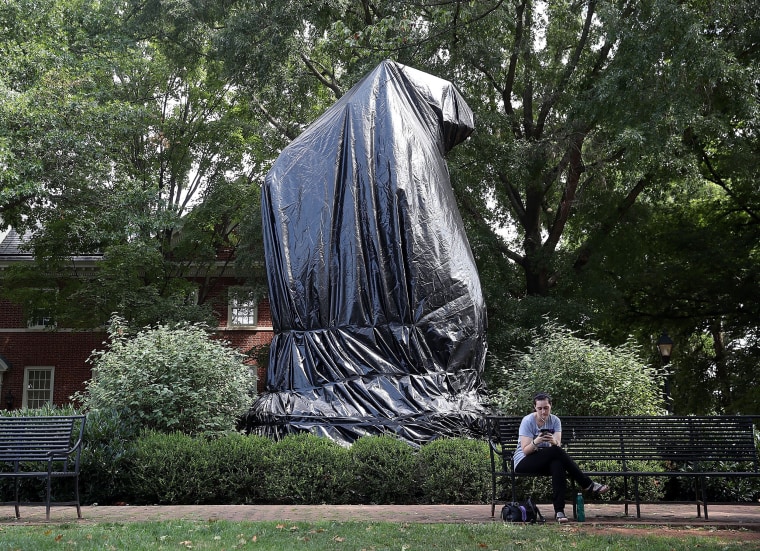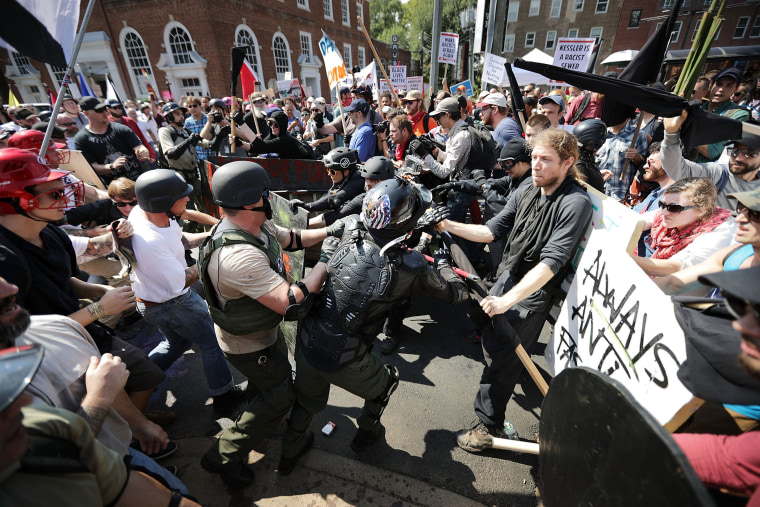The City Council in Charlottesville, Virginia, voted Tuesday night to remove a statue of Confederate Gen. Thomas "Stonewall" Jackson from a park after a public hearing punctuated by protests and chants of "Let her speak."
By voice vote, the council voted after 11 p.m. ET to ask a design firm to redesign Emancipation Park, where the Jackson statue stands — effectively ordering its removal once all court cases are resolved.
The vote would also expedite the relocation of a statue of another Confederate general, Robert E. Lee, that was at the center of a white nationalist demonstration in mid-August that led to the death of a woman after a car plowed into a group of anti-protesters.
The vote proceeded without incident — a sharp contrast from the public hearing earlier in the evening, when the council cut off a woman who was seeking to speak about the resolution during other business.
Much of the first two hours of the meeting was dotted with further interruptions from audience members seeking to return to the topic of the Aug. 12 protests, in which 19 other people were also injured.
The City Council last month agreed to consider a resolution to remove and relocate the Jackson statue and the one honoring Lee, which was at the center of the Aug. 12 protests.
The resolution wasn't due to come up until late in the evening, after discussion and public comment on other topics. It calls for removal of the Jackson statue "pending court decisions and/or changes in the Virginia Code," which includes a provision prohibiting removing certain war memorials.

As offered by Vice Mayor Wes Bellamy, the resolution noted that the monuments were erected several decades after the Civil War ended, calling them "20th Century testaments to a fictionalized, glorified narrative of the rightness of the Southern cause in that war, when the actual cause was an insurrection against the United States of America promoting the right of southern states to perpetuate the institution of slavery."
The City Council voted 3-2 in February to take down the Lee statue in Lee Park, but the city was sued in March to prevent the removal.
PHOTOS: Confederate Conflict: A Look at the Statues Sparking Heated Debate
Bob Fenwick, a City Council member who voted for the motion, said the Jackson and Lee monuments "should be in a museum."
"If people stop and think, we have no statues, that I know of, to George Washington in Charlottesville, and yet none of us have forgotten his history," Fenwick told NBC affiliate WVIR. "So this argument that we have to keep it to preserve history, to me, is irrelevant."
Both statues were covered in black tarpaulins last month as a symbol of mourning for Heather Heyer, the woman who was killed at the Aug. 12 rally.
Heyer was among the group of counter-protesters at that demonstration where white supremacists, white nationalists and other members of the far right convened to protest the decision to remove the Lee statue.

Tuesday night's vote comes as Confederate statues and other monuments are being taken down across the country in response to the events in Charlottesville.
President Donald Trump was criticized by both political parties for his response, which blamed "two sides" for the deadly violence.

